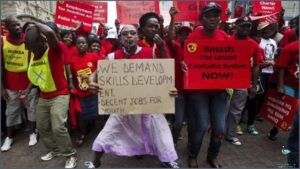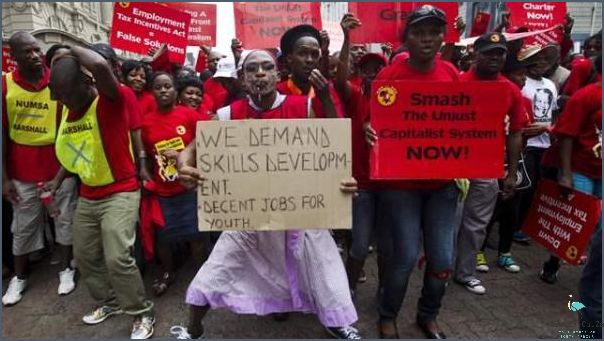
Poverty is one of the most serious problems facing South Africa today. It not only affects the quality of life of those who live in poverty, but also has a significant impact on the economy as a whole.
One of the main ways in which poverty affects businesses is through the consumption patterns of those in poverty. Poor consumers are more likely to spend a larger proportion of their income on basic necessities such as food and clothing, and less on discretionary items such as entertainment and holidays. This has a knock-on effect on businesses that produce and sell these goods and services.
In addition, poverty can also lead to increased crime rates. This is both due to the fact that those in poverty are more likely to turn to crime in order to make ends meet, and also because businesses located in areas with high poverty rates are often targeted by criminals. This can lead to higher costs for businesses, as well as a loss of customers and revenue.
Finally, poverty also has an indirect impact on businesses through the effect it has on the overall economy. When poverty levels are high, economic growth tends to be lower, as poor consumers have less money to spend. This can lead to reduced demand for goods and services, and can ultimately lead
Contents
How Poverty Affects Businesses In South Africa
Poverty in South Africa has a significant impact on businesses in the country. The high level of poverty means that there is less disposable income available to be spent on goods and services. This can lead to a decrease in sales and profits for businesses, as customers may not be able to afford the products on offer. In addition, businesses may struggle to find resources to use in production, as those living in poverty may not be able to provide the labour or access to resources that businesses need. This can make it difficult to manufacture or produce goods, leading to a decrease in productivity. Finally, poverty can lead to increased crime rates in an area, making it difficult and dangerous for businesses to operate. All of these factors can have a negative impact on businesses in South Africa, and it is essential that the government takes steps to reduce poverty levels in the country.
Economic Impact of Poverty on South Africa’s Businesses
Poverty is an ever-growing problem in South Africa, with over 55% of the population living below the poverty line. It is a multifaceted issue that affects not only individuals but also businesses in the country. South Africa’s businesses are feeling the economic impact of poverty, with many struggling to stay afloat in the face of rising costs and declining revenues.
The direct effects of poverty on businesses in South Africa include a decrease in consumer spending, a decrease in wages, and an increase in the cost of labor. When people are unable to afford basic necessities, they are forced to cut back on spending. This leads to fewer sales for businesses and a decrease in their profits. Additionally, when wages are kept low, businesses are unable to attract and retain qualified workers, leading to a decrease in productivity and efficiency.
Poverty also has an indirect effect on businesses in South Africa. Many businesses are unable to access the capital needed to invest in new technologies, expand operations, and hire additional employees. This limits the potential for growth and increases the risk of failure. Furthermore, businesses in poverty-stricken areas often face higher rates of crime and vandalism, which can be costly to repair and deter potential customers.
The economic impact of poverty on businesses in South Africa is clear. Businesses must find ways to cope with the effects of poverty and remain competitive in a difficult market. Some strategies businesses can implement include providing financial assistance to employees and offering services at discounted prices. Additionally, businesses should look for ways to increase efficiency and invest in technology to reduce costs. Finally, businesses should look for ways to collaborate with local initiatives to create a more sustainable economic environment.
South Africa’s businesses are in a difficult situation and it is up to business owners, employees, and citizens to work together to create a brighter economic future. With the right strategies and initiatives, poverty can be reduced, and businesses can benefit from a more prosperous economy.
Impact of Poverty on Labor Force

The impact of poverty on the labor force in South Africa has been a long-standing issue, and one that has been especially detrimental to businesses in the country. It is estimated that over half of South Africa’s population lives in poverty, and this has had a significant impact on the labor force.
The most obvious way that poverty affects the labor force is by limiting access to educational opportunities. Without access to education, it is difficult for individuals to acquire the skills and knowledge to be successful in the labor market. This has resulted in a skills gap in the labor force, as those with the most education and training are the most successful in finding employment. This has had a knock-on effect on businesses in South Africa, as they are unable to find the skilled workers they need to run their operations.
Furthermore, poverty has also had a detrimental effect on the health of the labor force. Poor health can lead to greater absenteeism from work, as well as a decrease in productivity. This has had a direct impact on businesses, as it has resulted in increased costs for sick leave and lower efficiency in their operations. Additionally, many South African businesses are unable to accommodate employees with poor health, meaning that they miss out on a potential source of labor.
Finally, poverty has also impacted the labor force in terms of access to resources. Those in poverty often have limited access to basic amenities such as transportation, electricity, and even food. This can make it difficult for individuals to travel to and from their workplace, meaning that they are more likely to be late or miss days of work. Additionally, the lack of resources can also lead to physical and mental exhaustion, meaning that employees are less productive. This can be especially detrimental to businesses, as it reduces their bottom line.
Ultimately, it is clear that poverty has a significant impact on the labor force in South Africa, and this has had a negative effect on businesses in the country. It is essential that businesses take steps to address this issue, as well as to create opportunities for those living in poverty to access the resources they need to succeed in the labor market.
Effects of Poverty on Consumer Spending
Poverty is an ever-present reality for many South Africans, and it can have a significant impact on businesses in the country. The lack of disposable income for consumers in poverty-stricken areas can have serious financial implications for businesses, from reduced sales to increased operational costs. In this blog, we’ll take a closer look at how poverty affects businesses in South Africa and what companies can do to address the issue.
First of all, it’s important to understand the scope of poverty in South Africa. According to the World Bank, over one-third of the population lives below the national poverty line. This means that millions of South Africans lack the disposable income to purchase products or services, even if they need them. For businesses, this means that their potential customer base is significantly reduced, resulting in a decrease in sales and a decrease in profit margins.
Another way that poverty affects businesses in South Africa is by increasing operational costs. For example, businesses may have to invest in additional security measures to protect their premises and products from theft and vandalism. This can be a significant expense, especially for small businesses. Additionally, businesses may have to invest in employee training and support programs to ensure that their workforce is properly equipped to handle the needs of customers living in poverty-stricken areas.
Finally, poverty can have an indirect impact on businesses in South Africa. For example, the lack of disposable income for consumers in poverty-stricken areas can lead to increased demand for government assistance. This can cause government budgets to be stretched thin, resulting in fewer funds available for infrastructure projects that could benefit businesses in the long-term.
So, what can businesses in South Africa do to address the issue of poverty? There are a few steps that companies can take to help alleviate poverty in their communities. First, businesses can provide job training and education opportunities for people living in poverty-stricken areas. This can help to increase their earning potential and enable them to better provide for their families. Additionally, businesses can invest in local infrastructure projects, such as improving roads or providing better access to electricity and clean water. This can help to improve the quality of life for people living in poverty-stricken areas and make it easier for them to access basic products and services.
In conclusion, poverty is a major issue in South Africa, and it can have serious implications for businesses in the country. From reduced sales to increased operational costs, businesses must take steps to address the issue of poverty if they want to remain successful. Fortunately, there are several steps that businesses can take to help alleviate poverty in their communities, from providing job training to investing in local infrastructure projects. By taking action, businesses in South Africa can help to improve the lives of people living in poverty-stricken areas and create a more prosperous future for everyone.
Conclusion
In conclusion, poverty has a considerable impact on businesses in South Africa, as it often leads to a lack of resources and capital, which in turn can severely limit the ability of businesses to grow and expand. Additionally, poor economic conditions often lead to high levels of unemployment, which can impact both the productivity and morale of employees. Overall, then, poverty is a major obstacle to the growth and success of businesses in South Africa.



